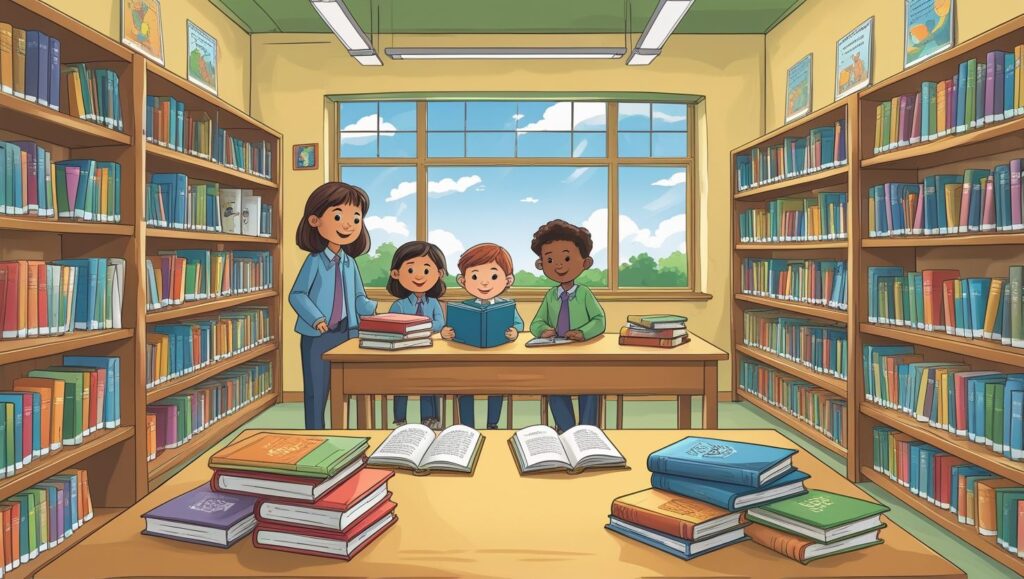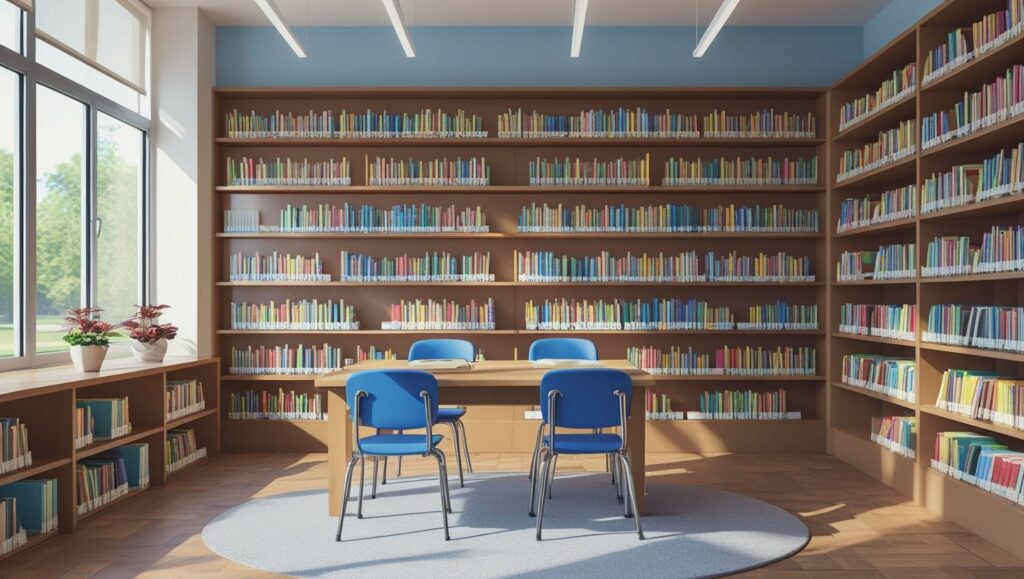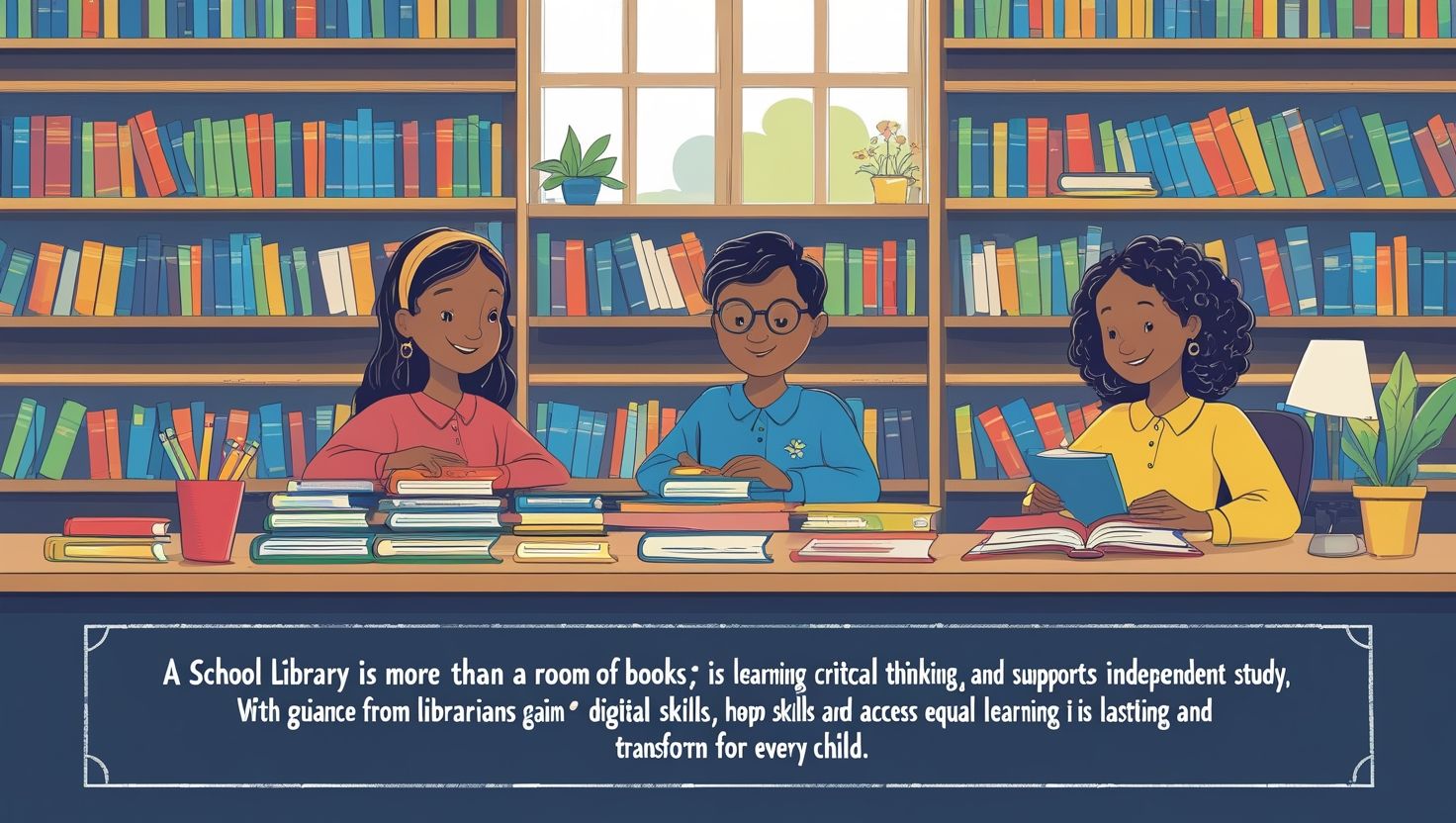Introduction
The Impact of School Library on Learning, A school library plays a central role in shaping the academic growth of students. It is not just a collection of books, but rather a hub for knowledge, curiosity, and creativity. When integrated effectively into the educational environment, a library nurtures critical thinking and enhances literacy skills. Teachers use it as a tool for extending classroom instruction, while students gain opportunities for independent learning. Moreover, school libraries bridge gaps by providing access to resources that some students may not have at home. As education continues to evolve, libraries stand as strong pillars supporting lifelong learning. They help learners engage with information, question ideas, and build confidence in their academic journeys. Therefore, the presence of a well-structured library significantly impacts learning outcomes. In fact, it strengthens not only knowledge acquisition but also social and emotional development, making it an essential part of every school.
Libraries as Knowledge Centers
School libraries act as knowledge centers where students are exposed to diverse learning materials. From textbooks and reference materials to digital resources and multimedia, they provide information in multiple formats. This variety caters to different learning styles and encourages students to explore beyond their classroom lessons. Additionally, the environment of a library promotes concentration and quiet reflection, which supports deeper understanding. With access to a wide range of subjects, learners can connect classroom knowledge with real-world applications. Furthermore, libraries help children develop a sense of curiosity, inspiring them to search for answers independently. This habit of self-directed learning fosters academic success and builds confidence in research skills. As technology advances, libraries combine traditional resources with digital tools, offering online databases and e-books. Hence, they become comprehensive learning centers where students can continuously expand their knowledge. Clearly, their role as knowledge centers strengthens academic performance and lifelong learning habits.
Enhancing Literacy and Reading Skills
A school library strongly influences literacy and reading habits. It encourages students to engage with stories, novels, and informational texts beyond their textbooks. By exposing learners to a wide range of genres, from fiction to biographies, libraries inspire a love for reading. Furthermore, access to age-appropriate materials builds vocabulary and comprehension skills. Teachers often use libraries to support literacy programs by integrating reading sessions and discussions. The quiet, structured environment motivates students to develop reading habits that last a lifetime. Moreover, school libraries play an important role in reducing reading gaps among learners with different backgrounds. By offering varied materials, they cater to both advanced and struggling readers, ensuring inclusion. The experience of browsing, selecting, and reading independently develops critical literacy. Importantly, research shows that students who read more perform better academically. Therefore, libraries strengthen both reading proficiency and comprehension, making them indispensable in supporting literacy growth.

Supporting Independent Learning
One of the key impacts of a school library is the promotion of independent learning. Unlike classrooms, where instruction is often teacher-directed, libraries encourage students to take charge of their education. When learners select books, research topics, or use digital resources, they practice decision-making and responsibility. This freedom builds confidence and nurtures problem-solving abilities. Moreover, libraries provide opportunities for inquiry-based learning, where students investigate topics of interest. The presence of guidance from librarians ensures they can develop research skills effectively. Furthermore, access to diverse resources means learners can pursue knowledge at their own pace, supporting personalized learning. Independent learning in libraries also prepares students for higher education, where self-directed study is essential. In addition, it cultivates lifelong curiosity and adaptability, both crucial in the modern world. Ultimately, school libraries empower learners to go beyond rote memorization and develop skills that strengthen critical and creative thinking.
Role of Librarians in Learning
The school librarian plays a vital role in shaping students’ learning experiences. Beyond managing books, librarians act as facilitators of knowledge. They guide learners in locating credible sources, developing research strategies, and evaluating information. This guidance is essential in an age where students are flooded with information online. Additionally, librarians organize reading activities, workshops, and skill-building sessions that promote literacy. Their support extends to teachers as well, providing resources for lesson planning and projects. Moreover, librarians encourage inquiry-based learning by helping students formulate questions and explore answers independently. They also create inclusive environments by recommending materials that cater to different cultural backgrounds and abilities. With their expertise, librarians help integrate technology into the learning process, introducing students to databases, e-books, and digital tools. Therefore, librarians are not only resource managers but also educators. Their active involvement significantly enhances the learning impact of school libraries and strengthens academic achievement.
Encouraging Critical Thinking Skills
A school library contributes to the development of critical thinking skills among learners. When students are encouraged to analyze information, compare sources, and form conclusions, they build higher-order thinking abilities. Unlike passive memorization, library use promotes questioning and evaluation. For instance, when researching a topic, students must decide which sources are reliable. This process trains them to identify biases and consider multiple perspectives. Furthermore, participation in library-based projects or debates strengthens reasoning and argumentation. Librarians often support these activities by providing diverse materials that represent different viewpoints. The variety of resources available ensures that students can examine issues deeply rather than superficially. Moreover, critical thinking extends beyond academics; it prepares students to make informed decisions in everyday life. Libraries, therefore, serve as training grounds for intellectual independence. By encouraging analysis, reflection, and evaluation, school libraries significantly contribute to nurturing thoughtful and responsible citizens in society.
Bridging the Digital Divide
In today’s digital world, many students lack equal access to technology at home. A school library helps bridge this digital divide by providing computers, internet access, and digital resources. These tools allow students to research, complete assignments, and practice technological skills. Furthermore, access to e-books, databases, and educational software enriches learning experiences. By ensuring that every student can engage with digital tools, libraries reduce educational inequality. Importantly, librarians play a role in teaching digital literacy, guiding learners in using online platforms safely and effectively. This skill is critical in an era where misinformation is widespread. Moreover, exposure to technology in the library environment prepares students for future academic and professional demands. It helps them become confident users of digital tools while maintaining responsible behavior online. Therefore, school libraries not only support traditional literacy but also foster digital inclusion, ensuring that every student can thrive academically.
Promoting Collaborative Learning
Although libraries are often associated with silent study, they also support collaborative learning. Group projects, discussions, and peer learning activities can take place within designated spaces. These opportunities allow students to exchange ideas, share resources, and work toward common goals. Furthermore, collaboration in libraries builds teamwork and communication skills, essential in both academic and professional life. Teachers and librarians often coordinate group tasks that require collective problem-solving, which strengthens critical and creative thinking. Moreover, the library environment encourages respect for diverse opinions, as students engage with peers from different backgrounds. Digital resources, such as shared online platforms, also support collaboration beyond physical spaces. Importantly, collaborative learning reduces isolation by promoting social interaction and peer support. This balance between independent and group learning makes libraries versatile spaces for holistic education. Thus, libraries nurture not only intellectual growth but also interpersonal skills, enhancing the overall learning experience.

Emotional and Social Development
Beyond academics, a school library also supports emotional and social growth. The peaceful atmosphere provides students with a safe space to relax, reflect, and manage stress. Reading fiction, for instance, allows learners to explore different perspectives and develop empathy. Furthermore, libraries often host events such as storytelling, book clubs, and cultural celebrations, which foster a sense of community. These activities enhance social interaction and create a supportive environment for students of all backgrounds. Additionally, the process of borrowing, returning, and respecting books teaches responsibility and discipline. For shy or introverted students, libraries serve as welcoming spaces where they can connect with ideas and gradually build confidence. Moreover, the encouragement of self-expression through reading and writing activities enhances emotional intelligence. Thus, school libraries play a dual role in nurturing intellectual development and emotional well-being. Their impact extends to building compassionate, confident, and socially responsible individuals.
Conclusion
The impact of school libraries on learning is profound and multifaceted. They provide students with access to knowledge, enhance literacy, and foster independent learning. Librarians act as guides, helping learners develop research and digital skills. Furthermore, libraries nurture critical thinking, bridge digital divides, and promote collaboration. Their influence goes beyond academics by supporting emotional and social growth. Importantly, libraries encourage students to become lifelong learners who are curious, confident, and empathetic. As education continues to adapt to technological and social changes, school libraries remain vital in ensuring equal opportunities for all. They act as bridges between knowledge and imagination, offering safe and inclusive spaces for learning. Therefore, investing in strong and well-equipped school libraries is essential for improving educational outcomes. Ultimately, their enduring role highlights the importance of nurturing both intellectual and emotional development in every learner.
References
- Lance, K. C., & Kachel, D. E. (2018). Why school librarians matter: What years of research tell us. Phi Delta Kappan, 99(7), 15-20.
- Todd, R. J., & Kuhlthau, C. C. (2005). Student learning through Ohio school libraries: A summary of the Ohio research study. School Libraries Worldwide, 11(1), 63-88.
- Krashen, S. (2011). Free voluntary reading. Libraries Unlimited.
- Williams, D., Wavell, C., & Coles, L. (2001). Impact of school library services on achievement and learning. Aberdeen Business School.
- American Association of School Librarians (AASL). (2018). National school library standards for learners, school librarians, and school libraries. ALA.

Thank you for the auspicious writeup It in fact was a amusement account it Look advanced to far added agreeable from you However how can we communicate